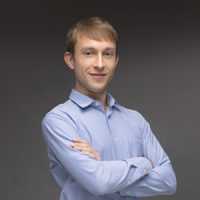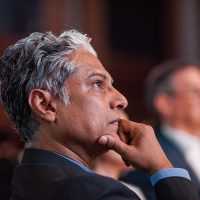Jeff Yao-chieh Hu is the founder and CEO of Turing Space, a Taiwan-based startup building cross-border digital identity solutions to strengthen trust in education, employment, and governance. Since its launch in 2020, the company has expanded into 12 markets across Europe and Asia, serving more than 550 government and enterprise clients and partnering with UNESCO, WHO, UNHCR, APEC, and agencies in Taiwan and Japan.
A lifelong technologist, Hu taught himself to code at nine, joined Taiwan’s national robotics team at 14, and placed 7th in the World Robot Olympiad at 15. He later studied computer science at the Hong Kong University of Science and Technology and continued his research as a visiting scholar at UC Berkeley, where he developed the foundation for Turing Certs, the company’s flagship product.
TOPICS Associate Editor Alex Myslinski sat down with Hu in August to discuss his early start in entrepreneurship, how Turing Space is addressing the growing challenge of digital trust, and why public speaking has become his favorite way to unwind. The following is an edited excerpt of their conversation.
What first sparked your curiosity for technology?
My dad worked in Taiwan’s semiconductor industry, so technology was always around me. At home we also had a collection of 80 biographies of important figures from history. As a child I wondered how one person, in just 80 years, could do enough to be remembered. That made me think about what I could create and leave behind.
I spent most of my time in robotics classrooms after school and at summer camps. At 14 I joined Taiwan’s national robotics team, and a year later I placed seventh in the World Robot Olympiad. Seeing my name on the official site felt like carving it into stone. It gave me the sense that when you put your effort in the right direction, you can leave a mark.
What did your early ventures teach you about timing and entrepreneurship?
My first internship was in San Francisco at a company building Google Glass products for doctors. I quickly realized that much of what I learned in school was already outdated. I would study Git or JavaScript at night and use it at work the next morning. That cycle showed me the pace of change.
I also realized something fundamental, which is that in the 21st century, invention alone isn’t enough. If you want your innovation to have an impact while you’re still alive, you need capital in parallel. That was my takeaway from Silicon Valley — innovation plus capital accumulation.
What gap did you see that motivated you to create Turing Space?
It started very small. I just wanted to make applying for graduate school easier. At that time you still had to go back to your original school, request an English translation, and mail your paper diplomas across borders. It made no sense. Our first project was helping schools digitize diplomas, and Berkeley Law became our first client.
Since then, the vision has grown. Today we are preparing for a future where nothing on your phone or computer can be trusted because AI can generate anything. People need fast, reliable ways to verify the truth. Our technology now protects digital diplomas, government certificates, and enterprise documents with multiple layers of verification — digital signatures, timestamps, hashing, and anchoring to independent databases.
The benefits are clear. If you are mailing 12,000 paper certificates to 160 countries, that takes huge cost and time. Digitally, it’s minutes. The carbon footprint also drops from tens of grams per certificate to about one gram, mainly from powering devices and servers.
Today, that work spans digital diplomas, government and enterprise certificates, cross-border identity verification, and anti-fraud protections. All of it is built on layered cryptographic safeguards to make trust fast, portable, and reliable.
You’ve described a risk of a “second Stone Age” online if people can’t tell what’s real. What do you mean by that?
Today we can sometimes spot an AI-generated image because it has six fingers. Soon you won’t be able to tell at all — whether video, voice, or text — and at that point, you can’t trust anything on your phone or computer. If we can’t verify easily, we’re back in the digital Stone Age.
In Taiwan, for example, fraud is a huge issue, especially through the LINE messaging app. A new account will pretend to be your child and ask for money. You should be able to send a quick digital challenge to the sender — “prove you are my daughter” — and get verifiable proof. It shouldn’t be a knowledge question like a birthday, which can leak, but a cryptographic proof tied to identity. That’s the kind of trust layer we are building at Turing.
How do you approach localization when expanding into new markets?
Localization is everything. In Japan, you must look like a local company in every detail — slides and website in Japanese, and ideally a Japanese team. We spent four years there and now finally have government and large-enterprise clients. It was slow, but trust is built by showing up.
Even details like how you hand over a gift in a meeting matter. My more junior colleague should hold the gift at first. Then, when we meet the client, she hands it to me, and I present it. If there are three boxes and five people, they will quietly set them aside and distribute them later, so no one is immediately left out. And when the meeting ends, you shouldn’t keep bowing as you walk out the door — my GM had to remind me, “Turn and walk out confidently.”
In Europe we take a different approach, working with Dutch and British partners so we don’t look like an outsider. To succeed globally, you need to look like the locals.
Regulations differ widely across borders. How do you manage that complexity?
We adopt the strictest standards, like those in Europe or the U.S., as our baseline. That choice costs time and money, but it means we are not redesigning for every jurisdiction. Compliance should not be the reason you cannot deploy — it should be the reason you can deploy responsibly.
What have you observed about how governments and institutions adopt digital systems?
Anywhere you go, you’ll find that there are two groups — those who want innovation and those who are conservative. If the decision-makers lean conservative, even a great idea won’t move. Timing matters.
Governments also serve citizens, so satisfaction is critical. If your technology aligns with a hot issue the public is discussing, you’ll be prioritized. If not, they may say, “Great idea, but not now.” Sometimes you have to help shape the conversation so people see the value.
How would you describe your leadership style?
Delegation is key. I look for people with high integrity who may be undervalued in their field, and I delegate everything to them. I only check the final result from time to time. My marketing director knows marketing better than I do — I don’t need to intervene.
Some characteristics are formed in childhood, like confidence, being outgoing, or having integrity. Those you filter for in hiring. The rest is capability, like how fast someone learns. To build that, I give my team challenges slightly beyond their scope. If I get a speech invitation, I may send a colleague who has never been on stage. They are nervous the first time, but much more prepared the second. Sometimes I send someone abroad with only two or three weeks’ notice. They learn by doing and come back different.
I also ask candidates how they release pressure. If you have a good way — hiking, scuba diving, anything — you can stay outside your comfort zone longer. That is where growth happens.
Where do you see Taiwan’s role in digital trust and global technology?
Europe is curious about Taiwan. Countries like Finland and Estonia ask how we prepare for national security and what technologies we use. People also want to know how Taiwan achieves such precision in manufacturing with affordable, highly skilled talent. That curiosity opens doors.
It is also a good moment for Taiwanese founders abroad. In the U.S., there are so many successful Asian founders in AI that venture capitalists are eager to back the next ones. It’s a good time to go out, learn, build networks — and then bring the work back to Taiwan with R&D, jobs, and tax bases here.
What advice would you give to young professionals?
First, find a role model — a good boss 10 or 20 years ahead who can show you their world. Everyone has a different speed of time. If you experience things earlier, you can push the frontier while you still have energy.
Second, become a producer of knowledge. In 2018, I was learning about blockchain. The tutorials I found didn’t work — they crashed halfway — so I wrote my own in Mandarin and English. People shared them, and soon I was invited to speak on the topic. You only need to be two weeks ahead of the general public to be seen as an expert. The pressure of questions pushes you to grow.
If you are 18 to 25 in Taiwan, try to leave Taiwan as early as possible to study or work. Taiwan is home — you can always come back to start a company, or for research and development, and hire locally. But when you are young, you learn fastest from the inconveniences of living somewhere new — not knowing the language, not even knowing what to eat for breakfast. That is how you grow your vision.

How do you see cross-border digital trust evolving?
It depends on the world. If it is peaceful, global collaboration accelerates — people move more easily, remote work grows, and visas and bank accounts become faster to set up across borders. That is where Turing comes in, providing fast channels between countries.
If countries close more doors, movement gets harder, and the opportunities shrink. Globalization slows, and some of these applications never happen. We prepare for both, but our job is to make trust portable when people and institutions need it.
What do you enjoy doing when you’re not working?
I don’t really separate work and life. Giving speeches or doing interviews actually helps me release pressure. Sharing my thoughts with students or audiences is low stress for me. I genuinely enjoy it.















